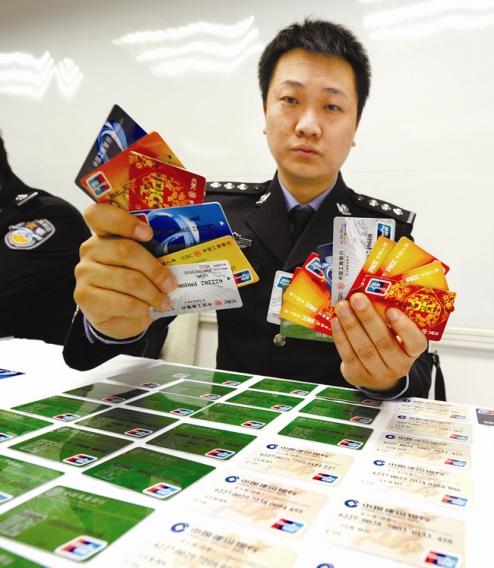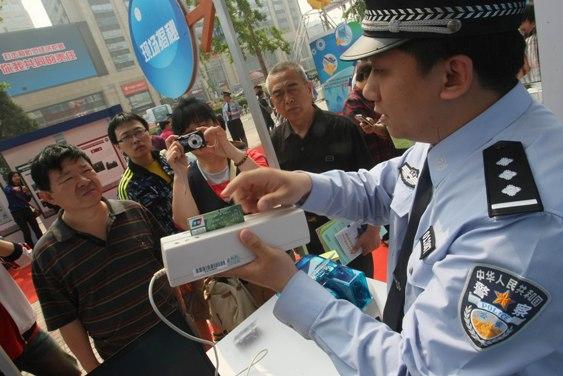
A police officer shows the credit cards used in fraud cases. LI WEN / XINHUA

A police officer demonstrates how information of a credit card can be stolen. MIRROR EVENING NEWS
Authorities should join forces to crack down on fake IDs
Xicheng district court heard 17 credit card fraud cases involving 2,4 million yuan from December 2007 to December last year, of which only about 170,000 yuan was recovered.
"Credit card fraud cases increase by 30 percent every year because of loopholes in issuing and managing credit cards," said Huang Qiang, a police officer with the economic crime investigation department of the Beijing municipal public security bureau.
Wu Qingxia, a woman from Jilin province, used a fake ID bought on the street to apply for 16 credit cards from seven banks in Beijing and drew more than 120,000 yuan from September 2006 to April 2008.
Eventually arrested, she received a five and a half year jail term and a fine of 50,000 yuan at Xicheng district court.
Huang said that because credit cards were introduced in China much later than other countries, the regulations are not comprehensive enough to prevent fraud, a situation exacerbated by the competition between banks for customers, which meant the application requirements for credit cards were not as strict as they could be.
"Fake ID information is at the root of credit card fraud," said Liu Yuxiao, deputy manager of the credit card center in China Everbright Bank.
Although every bank demands applicants use their real names to apply for credit cards, agents are still common during the process, and the applications are usually only dependent on the applicants' ID or copies of their ID.
Even if applicants submit the application materials themselves, the banks cannot verify the authenticity of the application.
"We cannot easily identify fake ID information because we have very limited channels to check the information," said Liu.
He suggested that the police, civil administration and banks should cooperate on an ID information sharing system to help banks verify applicants ID information. The system could be shared among banks and create a blacklist of people who apply for many credit cards and have unfavorable records with different banks.
"Once credit card fraud happens, our losses can be huge and they will not be paid back," Liu said.
Xu Liwen, chief judge of the second criminal tribunal of the Xicheng district court, said in most cases people used credit cards to overdraw and then did not have the capability to pay back.
Many criminals did not have regular incomes and personal assets, she added.
Fraud cases are also becoming more international and professional, as the credit card business in China became increasingly connected with international business, Xu said.
Zhuang Yan and Liang Shuai, who undertook higher education overseas, bought blank foreign credit cards and then imputed information they acquired illegally from the Internet to cash 600,000 yuan in Beijing in November 2008.
The case involved an international criminal chain that included an organized crime syndicate, credit card issuers and Point Of Sale (POS) providers.
The trans-boundary nature of the crime increased the difficulty in solving it.
"We could only investigate the domestic criminals and not the overseas vendors who sold the information," said Cheng Jie, judge of the second criminal court of Xicheng district court.
Cheng said the POS terminal involved in the case was located in Beijing and advised local banks to regulate the management of POS terminals to limit fraud cases.
He said that both the operating strength and tax payment of the units should be verified; especially those POS terminals used for foreign currency transactions.





